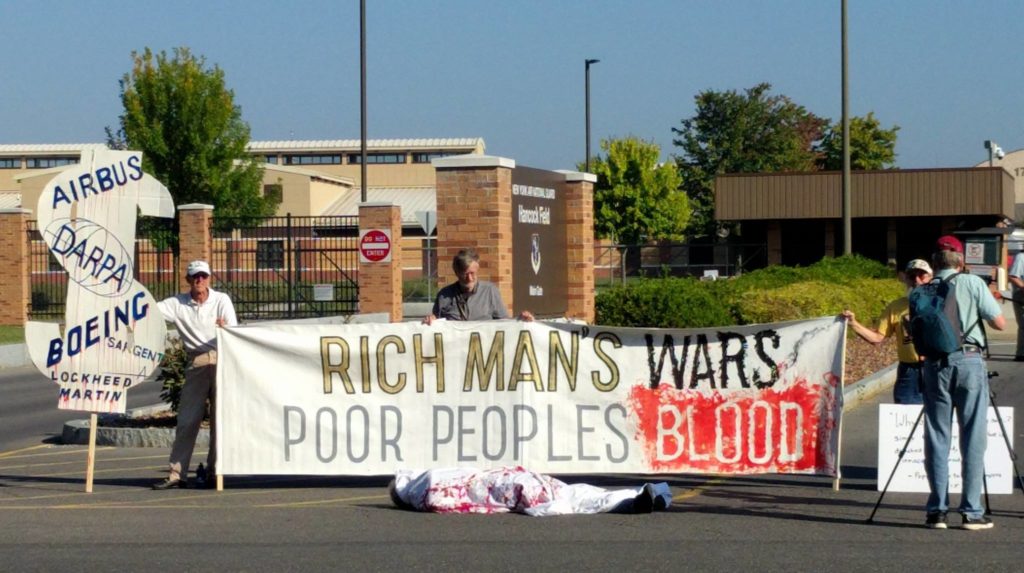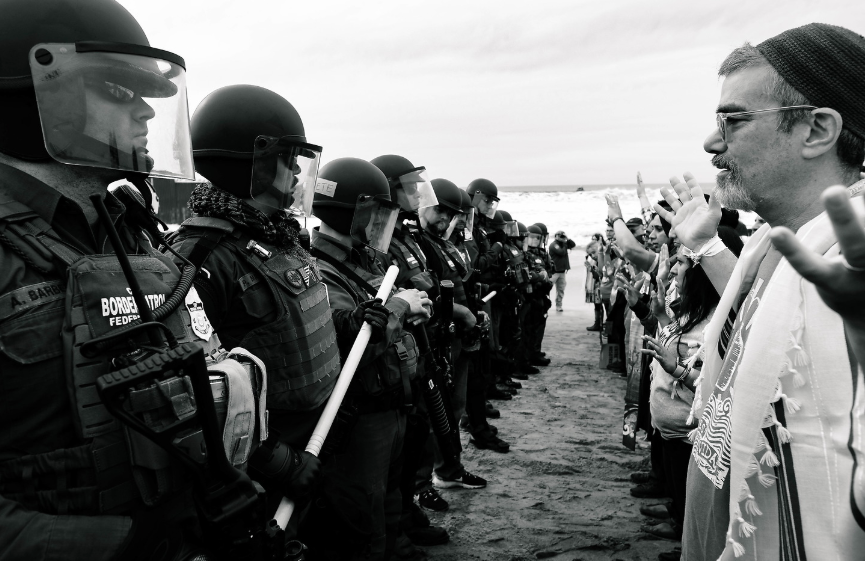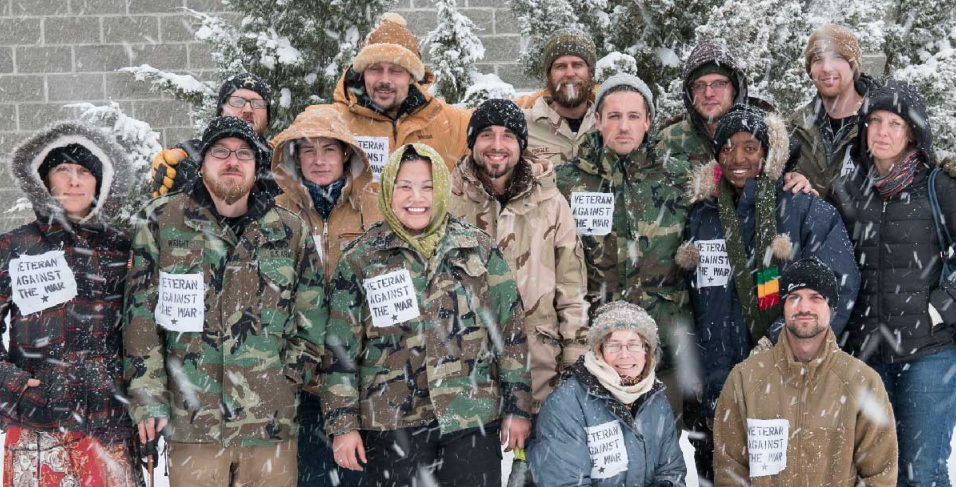A Poor People’s Resistance to War is an orientation toward war from a perspective based on the principles of the Poor People’s Campaign: A National Call for Moral Revival. We, the poor, forced through our dispossession to work or enlist in the military in order to survive, take this orientation toward war. Wars are fought in the interest of the wealthy, for the gain of the wealthy. War’s primary victims are the poor of the countries that are invaded and the poor of the US. Children are especially vulnerable.
Rich Men’s War, Poor People’s Fight
Rev. Dr. Martin Luther King, Jr. was clear when he said in 1967 that we must be “compelled to see war as an enemy of the poor and attack it as such.” The first victims are the poor of Iran, Iraq, Afghanistan, or any number of countries decimated by US intervention. Over half a million people have been killed in US wars in Iraq, Afghanistan and Pakistan since 2001, and many of the resources that belong to their populations collectively are being extracted and sold off by US-based oil companies. In addition, Americans recruited by the “poverty draft” have to go abroad to fight and kill and come home scarred and broken, if we come home at all. On average 20 of these veterans commit suicide every day. Meanwhile, we watch our tax dollars get drained away for violence instead of being allocated to basic needs. The wars the United States and its allies wage are wars of the rich against the poor.
The wars waged by the wealthy are for the benefit of the wealthy, many of whom make tremendous profits from war. Out of the top five most profitable military contractors, four are US companies. Together, those four companies received $117.9 billion in military contracts in 2018, and their CEOs receive tens of millions of dollars a year.

A Distorted Moral Narrative
It’s difficult to get a nation of people to consent to endless war for the benefit of a tiny elite. For that reason, wars are justified by the same distorted moral narrative that keeps the poor at home poor. Wars are necessary, so the narrative goes, to protect “us” at home from some danger abroad. Nuclear weapons are the ultimate tool of the wealthy, and idea of nuclear capacity as deterrence is part of the false narrative. While the mythology says having nuclear weapons prevents their use, Daniel Ellsberg famously pointed out that nuclear weapons are used every day in the way that a gun held to someone’s head suppresses them even if the trigger is never pulled.
The “cruel manipulation of the poor” that Rev. Dr. King denounced is still the wealthy’s central strategy. One of the primary tools to further this manipulation, to keep the poor and dispossessed separate and blaming each other, is racism. We have witnessed the explosion of Islamophobia and racism against Middle Eastern peoples over the past two decades. White supremacist attacks on African-Americans, Jews and immigrants have increased with the tacit support of the highest levels of government. Violence against women and LGBTQIA+ folks is another enemy of the poor. Yet the truth is that the poor here in the US have more in common with the poor abroad than we do with the wealthy at home. Our common position as the great dispossessed majority of the planet means that we will only find liberation through a deep transformation of the poverty-producing system that is held in place by militarism and systemic racism.
No Military Occupation, No Sanctions!
Long after the wars of the wealthy are officially over, things do not return to normal. The war may end in name, but aggression lasts in the form of military occupation, for years or decades. The Iraq War officially ended in 2011. Yet as of January 2020, nearly nine years later, the military occupation of Iraq continues. A Poor People’s Resistance to War demands the end of the wealthy’s wars before they even begin; but it also demands that the soldiers and legions of private military contractors return home. Endless military occupation is part and parcel of the cycle of endless war for the wealthy.
The wealthy do not always agree on how to fight their wars. Some want military escalation, gunfire and bombs dropping. Others want less dramatically visible (to American eyes) but no less coercive measures like economic sanctions. During the anti-war movements of the first and second Iraq Wars, some adopted the unfortunate slogan “Sanctions Not War.” Between the Iraq Wars, countless poor Iraqis were casualties of the anti-poor sanctions strategy against Iraq, most under the age of five. Between 2017 and 2018, US-imposed economic sanctions were responsible for 40,000 deaths in Venezuela. This is not peace. It is only the wealthy’s war waged economically, rather than militarily.

Militarism Is Ecological Devastation
Through military and economic warfare, the wealthy have impoverished large portions of the globe. Beyond the military and economic fronts, there is a third offensive by the wealthy against the global poor. This is the climate offensive. The World Bank estimates that between 75 and 80 percent of the cost of the rapidly escalating climate crisis will fall upon countries impoverished in this way. The same US military that puts the world’s poor under the gun feeds this trend, as one of the largest polluters in history. War leaves behind multiple toxins such as unexploded ordinance, neurotoxins, heavy metals and what the military refers to as “radioactive commodities” including depleted uranium. At the same time, health care is blocked through sanctions. The US military emits more carbon dioxide into the atmosphere than most of the world’s countries do. The Department of Defense was responsible for 72 percent of the US government’s total greenhouse gas emissions in 2016, while those least responsible for the climate crisis bear the worst of its effects.
Systemic Racism and the War at Home
Militarism abroad means militarism at home. Military weapons and equipment, from grenade launchers and M-16s to large armored vehicles, are found in police departments across the country. As of 2017, at least 22 school districts obtained surplus military equipment through the Department of Defense’s 1033 Program. These weapons and this equipment end up being used most of all against the most vulnerable segments of the population. To resist war also means to call for an end to the 1033 Program and an end to the militarization of law enforcement.
The history of this country has been defined by military campaigns of genocide and forced removal by European settlers and their descendants against the nations already existing on this land. This process of military subjugation is not relegated to history books (much of the Native genocide does not even reach history books, for that matter). In 2016 and 2017, law enforcement armed through the 1033 Program, along with the National Guard, attacked and dismantled a Native-led encampment of water protectors attempting to halt construction of a new oil pipeline at Standing Rock in North Dakota. This act continued the foundational American tradition of anti-Native military campaigns and continued the practice of using the military for the benefit of the wealthy. A Poor People’s Resistance to War recognizes that the policies of the US settler state are linked to US-led war abroad, and stands in solidarity with indigenous nations in their struggle for sovereignty and self-determination.

Black communities also know military aggression too well, as witnessed during the Watts rebellion of 1965, the bombing of MOVE offices in Philadelphia in 1985, the Ferguson uprising of 2014, the Baltimore uprising of 2015 and many other instances. In these more recent cases, protestors were met with armored vehicles and tear gas, a scene fit for a war zone. A Poor People’s Resistance to War stands in solidarity with those resisting systemic racism, in its militarized form and in all other forms.
War is a Bipartisan Effort
Military-style operations at Standing Rock and Ferguson were done with the support of federal agencies including the Department of Homeland Security, under a Democratic administration. Wars in Korea and Vietnam, bombing campaigns in Iraq and Libya, and the 2014 earmarking of one trillion dollars for “modernization” of the US nuclear arsenal are only a few of the many items of evidence that wars for the wealthy are a bipartisan effort in this country. Resisting war is not a cause that finds its home comfortably in the Democratic nor the Republican Party.
Unite the Poor to End All War
A Poor People’s Resistance to War does not only resist military deployment and gunfire, it resists all coercive measures of aggression against the world’s poor. It recognizes the struggle of the poor as one without boundaries, common to the poor worldwide. It recognizes as well the organic relationship between endless military campaigns abroad and racialized, military-style state violence at home. Where the wealthy offer militarism and colonialist arrogance, our nonviolent resistance advocates friendship, peace, and international solidarity. We know that this is inseparable from our struggles against the effects of poverty, systemic racism and ecological devastation at home.
Rev. Dr. King ended his 1967 “Beyond Vietnam” speech with the following message: “Our only hope today lies in our ability to recapture the revolutionary spirit and go out into a sometimes hostile world declaring eternal hostility to poverty, racism, and militarism.” These days as the drums of war are sounding yet again, we as part of the New York State Poor People’s Campaign: A National Call for Moral Revival take strength from those who have come before and march on toward the day where the united people of the world can tell all governments that we ain’t gonna study war no more.
Together we are building a movement of the poor and dispossessed — join the NYS Poor People’s Campaign today!
—The New York State Poor People’s Campaign
(Special thanks to Corey McGrath for drafting the majority of this statement)
